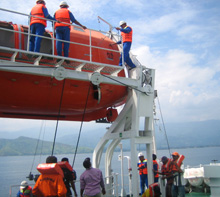Supporting the maritime sector of Timor-Leste

Maritime transport is extremely important for both economic and cultural development in Timor-Leste and for the integration of remote areas into the country. Expanding the transport infrastructure is essential for further economic .
Maritime transport is extremely important for both economic and cultural development in Timor-Leste and for the integration of remote areas into the country. Expanding the transport infrastructure is essential for further economic
Project description Title: Advice and Training to the Maritime Related Industries of Timor-Leste Commissioned by: German Federal Ministry for Economic Cooperation and Development (BMZ) Country: Timor-Leste Lead executing agency: Ministry of Transport and Communications (MTC) Overall term: 2017 to 2021 Timor-Leste. Practical exercises at sea are an important training element. © GIZ Context Maritime transport is extremely important for both economic and cultural development in Timor-Leste and for the integration of remote areas into the country. Expanding the transport infrastructure is essential for further economic growth and increased employment in tourism, fishing and logistics. Moreover, transport is a declared government objective and enshrined in Timor-Leste’s Strategic Development Plan. However, the maritime sector is not yet capable of taking action as is expected on the international stage. Well-trained maritime professionals and sailors, as well as a structured legal framework will help to develop a more sustainable and far-sighted maritime sector. Objective The maritime sector of Timor-Leste increasingly operates in accordance with internationally recognised standards in terms of law, institutions and human resources. Approach The project “Advice and Training to the Maritime Related Industries of Timor-Leste” is working together with Timorese partners. Advisory services are provided to the Ministry of Transport and Communications on creating the necessary legal framework. This will require the national maritime and port administrations to operate in line with international standards. The newly established maritime administration receives technical support in setting up a ship register that will enable Timor-Leste to register ships under the country’s own flag. Also, the procedures for the creation of a ship inspection system and a seafarer certification system fall into the scope of the project activities. The project supports the port administration in managing and operating the German-financed Berlin Nakroma ferry, which connects the capital city Dili with the enclave Occussi. It provides on-the-job training for technical personnel and supports efforts to bring ferry operations into line with international standards. Advice on the development of a comprehensive safety strategy for the port is to make working conditions safer in the port of Dili and reduce the likelihood of accidents. In response to the severe skills shortage in the maritime sector, the project also supports short-term measures designed to meet the immediate need for skilled labor. At the same time, the Timorese-German Maritime Training Unit (TGMTU), which was set up under the predecessor project, receives advice on continuing and refining specific training courses that are needed for the further development of the sector. The Secretary of State for Professional Training and Employment Policy receives advice on curricula and course content and on equipping TGMTU to hold training in accordance with the international standards. The consortium AMBERO-RINA Consulting implements the project on behalf of Deutsche Gesellschaft für Internationale Zusammenarbeit (GIZ) GmbH. Results Decision-makers in government and parliament are aware of the need for ratification of maritime conventions. Two national regulations and three international conventions have already passed the approval of the Council of Ministers. So far, 54 Timorese seafarers have been trained for the German-financed Berlin Nakroma ferry and other ships operating within the national waters. The new facilities of the Timorese-German Maritime Training Unit have been equipped and operate in accordance with the international standards. Since the beginning of the project nearly 1,300 individuals have participated various courses on the topics of safety, marine environment, cargo handling etc. The maintenance processes of the Berlin Nakroma ferry have substantially improved during the last three years. The ferry is currently going to a dry dock once a year, which happens in accordance with international standards.




